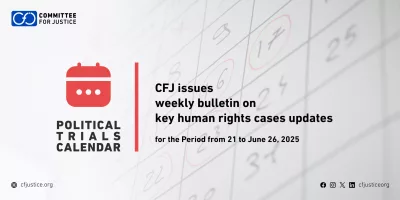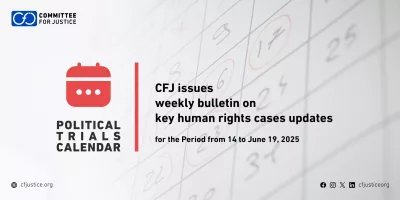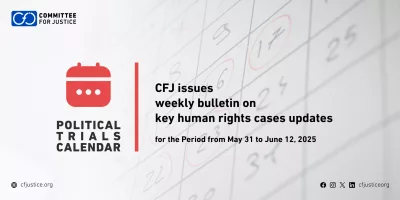CFJ annual report: 2020: A year of breaching the right of defence
The right to a fair trial is one of the most basic human rights guaranteed by international covenants and treaties. It is enshrined in Article 10 of the Universal Declaration of Human Rights, which guarantees every person the right to have their case heard before an independent and impartial court.
In pursuit of this right, the Committee for Justice (CFJ) issued a report today entitled “2020: A year of breaching the right of defence,” which monitored the ongoing violations in civilian and military courts in Egypt until December 2020. The report is part of the organization’s Fair Trials Monitoring project, which aims to create a fairer judicial system and a more humane penal system in Egypt.
Objectives and Methodology of the Fair Trials Monitoring Project:
The project analyzes the various stages of trials according to available papers. It monitors, analyzes and proves the key violations that represent a clear violation of the principles of the constitution’s supremacy, justice and equality of all individuals before the law and human rights, especially for individuals deprived of their freedom. It also provides support to lawyers, researchers and human rights defenders, by clarifying the major ongoing violations in the course of litigation, local and international laws, while providing case papers to those interested in law and justice affairs, especially in the absence of an archive of military cases.
In its project, CFJ followed a specific methodology based on analyzing the case papers, or what was available from them, to find out all their details and processes, and to evaluate the performance of justice and litigation institutions with the various parties to the case, with an emphasis on the project’s handling of all justice systems in the Egypt (military judiciary, terrorism circuits, emergency supreme state security courts, and civil criminal justice).
90 cases against 3,200 citizens:
CFJ said that during the year 2020, its team worked on analyzing about 90 cases considered by civil and military judicial authorities in Egypt since 2013, against 3,200 citizens, noting that 2020 was by far the year of violating the right of defence.
The organization indicated that 31 minors were among the defendants in those cases, and 5 death sentences were issued, 672 citizens were sentenced to life imprisonment, 304 citizens were sentenced to temporary imprisonment, while only 195 were acquitted.
Observed phenomena:
In its report, CFJ observed several phenomena, the most important of which is the phenomenon of “recycling” cases for the defendants, where the organization’s Fair Trials team observed the recycling of cases for 101 accused / convicted persons while completing the procedures for their release from other cases.
The organization’s team also monitored 266 cases of enforced disappearance during its analysis of case papers in 2020, the number of enforced disappearances inside police stations – according to what the victims listed – reached 88 cases, while the number of enforced disappearances inside the headquarters of the National Security apparatus reached 71.
Moreover, 144 incidents of torture and physical and moral coercion that occurred against the victims during the course of the investigation were monitored. The victims have identified the responsibility of officers / employees / soldiers of the police and national security services for 82 of them only, and according to the victims’ accounts, the majority of these torture incidents took place inside police stations and National Security headquarters.
The organization’s fair trials team also noted that the concerned investigation authorities did not take any action regarding 90 of the total 144 incidents that the victims listed, and in the course of the investigation they provided details of their time and place, and even those in charge of them, and therefore, no injuries were taken into consideration except in only 4 incidents. The investigation did not stipulate that the victims were free of injuries, except in 10 cases.
The CFJ report also monitored violations of the right to defence among the cases under analysis, the most important of which was the confiscation of the right to defence in the preliminary investigation sessions, and using the pretext of the state of necessity and urgency to justify the absence of defence during the investigation of the accused, as well as citing the closure of the Syndicate and the absence of lawyers, while ignoring the complaints of those subjected to enforced disappearance and torture.
The Fair Trials team also indicated that the papers of many military cases showed that their common denominator is a breach of the right of defence, as the court does not respond in any way to the requests and defense of the accused.
Recommendations to Egyptian authorities:
The report stressed that these violations are not a consequence of the Covid-19 pandemic, as the executive and judicial authority in Egypt claimed, but rather are codified procedures, deeply entrenched in exceptional prosecutions, especially the Military Prosecution and the Supreme State Security Prosecution.
The organization recommended, at the conclusion of its annual report, to abolish the legal texts that allow the trial of civilians before exceptional judicial bodies, with the need to enact legislation that regulates compensation mechanisms for pretrial detention, and to amend the Supreme Constitutional Court Law No. 48/1979 that allows for a plea of unconstitutionality to be filed against laws through direct prosecution.
CFJ also called on executive authorities in Egypt to stop referring cases against civilians to military prosecutions and courts, and Emergency Supreme State Security courts, and to release lawyers and human rights defenders who are held in pretrial detention pending cases because of their professional and human rights role.
Likewise, the organization called for an extensive investigation to be opened into the prosecution’s disregard for the complaints of the defendants for being subjected to enforced disappearance and being subjected to torture from 2014 to 2020, and taking the necessary legal measures against this phenomenon. It also urged the Public Prosecutor to issue instructions limiting the use of the exception stipulated in Article 124 of the Criminal Procedure Law, which allows the investigation of the defendant in the absence of his lawyer.
Also, activating the provisions of the constitution, the Legal Profession Law, and the Criminal Procedure Law that enable the defendant’s lawyer to review the papers and take official copies of the investigations and meet the defendant alone before the investigation to activate the principle of the participation of the legal profession with the judicial authority in achieving justice and the rule of law.
Another recommendation is to reconsidering the draft agreement concluded between the Ministry of Justice and the Ministry of Communications regarding the remote renewal of pretrial detention by using Internet and communication technologies, by considering the renewal of the detention of the defendant via video conference and opening a dialogue with the concerned civil society organizations and the Lawyers Syndicate about the nature of this agreement and the mechanism for its implementation in a way that guarantees rights of the defendant and his defence.
The CFJ also called on the security authorities in Egypt to activate the inspection sector at the Ministry of Interior, open an investigation into the complaints lodged against officers, holding accountable those involved in torture, enforced disappearance and recycling of cases, and to end the crackdown against lawyers, activists and human rights defenders. It also called for activating the provisions of the constitution and the law that allow the defendant to contact his family and lawyer from the time of arrest until the implementing of the ruling, implementing the text of the prison regulations allowing the defendants and convicted persons to communicate by phone while in detention, and implementing court rulings of acquittal and the release decisions and to end the recycling of cases, and hold accountable the officers involved in these types of practices.






